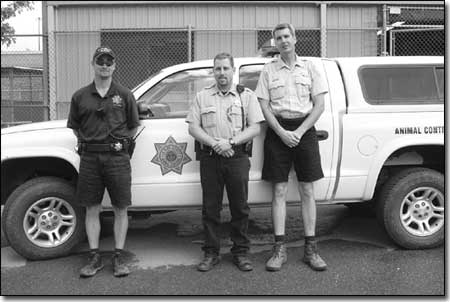|
Director says lack of funding, high
turnover hinder agency’s effectivenessby Amy Maestas
 |
| From left, Animal Control officers
Jon Patla, Dan Parsons and Mike Lively beside their
vehicle at the La Plata County
Humane Society./Photo by Todd Newcomer. |
D urango has long had a reputation for being a dogcentric town, with
locals often joking that dog ownership is a prerequisite for living
here. However, as heartwarming as this notion sounds, it's starting
to strain those in charge of keeping dogs in order.
"Since the county continues to grow so much, we definitely are dealing
with more issues," says Mike Lively, director of La Plata County Animal
Control.
Lately, Lively says he's been trying to shift the agency's focus to
address these issues with a major goal in mind: public safety. That's
particularly important to Lively since two loose pit bulls mauled a
young boy in Pagosa Springs in December 2002. The 10-year-old boy was
attacked on the head and ended up losing 75 percent of his scalp and
suffering 40 puncture wounds to his face and body. The incident shocked
a community and sparked debate over dog responsibility. The reverberations
were felt all the way to La Plata County.
"What I learned from that is that we need to keep teaching people about
their responsibilities," says Lively. "I think in the past we may have
let things slip by too much, like letting people get away too often
with not having their dogs on leashes. I don't want to be complacent
about such small things anymore. If we are complacent, it will lead
to something like what happened in Pagosa."
Recently, Lively asked the City of Durango to increase animal controls
fines. Fines for first offenses would increase $10, but fines for second
and third offenses would double. Hopefully, Lively says, this will encourage
people to be more conscientious about the county's biggest animal control
problem - dogs at large.
Lively says that with the opening of the Durango Dog Park, the agency
has received fewer calls complaining about unleashed dogs. For that,
he says he's grateful.
 |
| Animal Control Officer Mike Lively
checks on the status of a dog in the La Plata
County Humane Society kennels./Photo by Todd Newcomer. |
"I'm lovin' the dog park," he says.
But while the number of calls about dogs decreased, the number of fines
issued increased. Last year, Lively says the agency issued about 128
tickets. That's a drastic rise compared with the previous five years,
when Lively says tickets averaged about 18 per year.
"Those really, are relatively low numbers. If you look at the population
of the county, plus consider that we receive about 4,000 total calls
per year, that's really not high."
It's not that Lively wants high numbers of tickets issued. He says
he doesn't want the public to think of animal control as an extension
of law enforcement. Nor does he want the public to perceive the agency
as a revenue generator.
Instead, he wants to get the dog problems in the county under control
so that Animal Control can adequately address other
animal control problems that continue to arise, such as threats to livestock
and animal cruelty. It's becoming increasingly difficult, he explains,
because the Animal Control agency is understaffed and somewhat under
funded.
"I think people think we just drive around looking for dogs not on
leashes," he says. "But we don't. We have many duties, and we play many
roles. We are also paramedics, counselors and range managers."
Animal Control has four officers, with only two on duty at a time.
One officer is responsible for the county; another is responsible for
the city. Lively says it's not enough coverage, especially considering
that the agency has not added an officer to its staff in eight years.
"The county has grown a lot in that time, but we haven't had more officers
to match it. We've had the bike path built, and the city has annexed
a lot of land," he says. "These have added to the number of calls we
get, yet we still have the same number of people handling issues."
 |
Bubbers, a 2-year-old mixed breed,
approaches his kennel door Tuesday
afternoon./Photo by Todd Newcomer. |
The City of Durango and La Plata County jointly fund Animal Control.
Each year, Lively submits budgets to both entities. Last year, he says
the agency's total budget was $204,000. But this year he will need more
in an effort to increase the agency's efficiency and effectiveness.
Lively hopes to get increased funding in an effort to combat the high
turnover rate. He reports that in the last year and a half, nine officers
have left the agency, mostly because the pay (which Lively reports only
as being less than the Western Slope average of $13 per hour) is low,
and the 10-hour, on-call shifts are too demanding for the wage.
"The turnover rate has been 225 percent. The job is too stressful,
and it's hard to retain people at that pay scale," he says.
In addition, Lively says the budget isn't quite enough to allow the
officers to adequately deal with time-consuming cases like animal cruelty.
Plus, the city has a cruelty-to-animal law, but the county does not.
Lively says this makes it difficult when officers have to pursue a case
in the county, because they have to rely on a state law, which is often
broad and too severe.
When pursuing an animal-cruelty case, officers often act as proxy lawyers
in an effort to prove their cases of negligence, malice or deprivation.
Lively says it's challenging to successfully prosecute an individual
because of the time-consuming and intense requirements.
"You have to have all of your ducks in a row and all of your T's crossed," he
explains. "Even then, it's hard. It's even harder when we have to use
the state law that often is too hard to apply."
To tackle that, Lively plans to propose and successfully enact a county
animal cruelty law. He's confident that it will pass. But until then,
and until Animal Control is able to secure a larger staff and increased
funding, Lively says his agency will still focus on educating people
about their responsibilities - and the laws that require them to. He
says Animal Control officers might not be lax in ticketing lawbreakers,
but they will continue to step up enforcement in order to keep the public
safe and prevent a dog mauling or some other tragedy.
"Animal control is about people," he says. "It isn't about punishing
people for having animals. I think it's important that people make that
distinction."
|